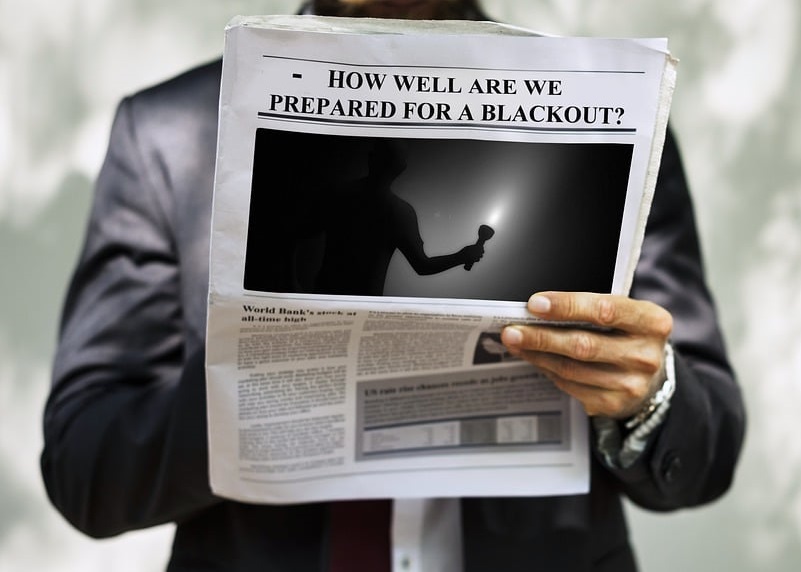☀️ Solar panels can work in a power cut, but only if they’re installed with a battery and a relay.
☀️ Power cuts cause solar panels to automatically switch off to protect electrical utility workers.
☀️ About 23% of the homes in the UK are affected by power cuts each year, and it’s going up.
Solar panels are getting cheaper year on year, which means more households in the UK can benefit from lower electricity bills and a lower carbon footprint which is great for your wallet and for the planet.
But before you go get solar panels installed, you’ll want to understand everything about them, including how they can keep your home appliances working during a power cut, which happens far too often in the UK now.
But don’t fret, it’s completely feasible. In this guide, I’ll tell you how to achieve this goal, how much it’ll normally cost you, and whether it’s vital for your home.
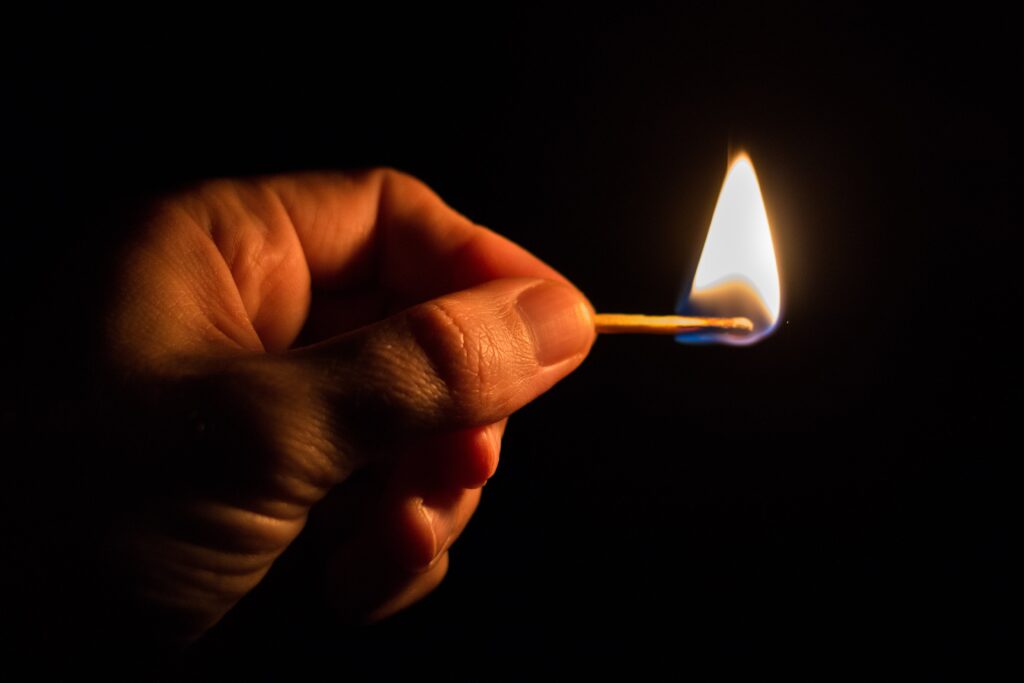
Do solar panels work in a power cut?
Yes, solar panels can function in a power cut – but only with the right setup from your solar panel installer, who should be an MCS Certified Installer in the UK.
Most solar panel systems will automatically shut down when a power cut occurs, this is to protect the electrically utility workers who could be working on the National Grid electrical system, like on the overhead or underground cables, but for an extra fee, your solar installer can equip your solar panel system with a device that allows it to transfer power from your solar battery to your home when the National Grid fails.
Without this additional option, both your solar panels and your solar battery will be useless during a power cut.
How do you make sure your solar panels work in a power cut?
Solar panels can operate in a power cut by disconnecting from the National Grid – but it requires some planning.
If your home is already off-grid and independent from the National Grid, your solar panels will keep functioning as usual.
Otherwise, you can choose to switch your home off the National Grid temporarily.
How do you temporarily leave the National Grid and go off-grid?
You can temporarily disconnect your solar panel system from the National Grid by adding a relay (a switch) to your solar battery and solar panels that will cut off your solar PV system from the National Grid in the event of a power cut.
Some solar installers call this an Emergency Power Supply (EPS), but it’s only a switch. Your solar PV system will be more expensive with this extra component, but not by much, we’re talking about an extra £350 – £500, in most cases.
The relay (switch) makes sure your solar power keeps your home appliances running, the solar power doesn’t go to the National Grid, in a process called islanding.
Solar islanding is when a home solar panel system continues to generate electricity even though the National Grid is down. Many people would consider this a good thing, as your home still has power from your solar panels while everyone else has no power.
You should also check that your battery inverter can handle all the electricity you need at once, or it could fail.
For example, if your battery inverter is 2kW and you use a 3kW oven, it won’t work, your oven requires too much power.
Look at your home appliances, and think about which ones you’d use during a power cut, and choose the size of your battery inverter based on how much power you’d need at once.
Why don’t solar panels automatically work in a power cut?
Solar panels need to stop working during a power cut for safety reasons, and this is a legal requirement in the UK.
When they’re on, your solar panels give extra electricity to the National Grid. This could harm the electrical engineers fixing the lines if there’s a power cut.
That’s why solar inverters turn off automatically when they sense a sudden power cut.
How long can solar panels power your home in a power cut?
A solar battery can keep your home powered for hours or days with solar panels during a power cut.
The average solar battery can store up to 6.5kWh and the normal 3-bedroom household uses about 8.2kWh per day according to Ofgem, so if you have two 6.5kWh (13kWh) solar batteries or three 3.3kWh (9.9kWh) batteries you should have enough power for a day, or more with full batteries and no energy saving.
You can extend your power for days with 5kWh of solar power if you use it wisely. Just avoid using appliances like a washing machine, a tumble dryer, or your main oven, and don’t boil your kettle too often, get a thermos flask or two.
Sadly, power cuts often occur unexpectedly in the UK, so you may not have a fully charged solar battery ready.
A good solar PV system will usually give you about half a battery of power at any one time, under normal operating conditions.
That should be enough to cover your essential appliances for most power cuts, which don’t normally last more than a few hours, even in the UK.
If you think you need a bigger solar battery for your home, we suggest monitoring your power usage with a smart meter – your energy supplier like British Gas, Octopus Energy, E.ON, or EDF Energy can give you one for free.
When you figure out the solar battery size you need, remember to include anything important that needs steady power, like medical devices or your fridge and freezer.
Will your solar panels charge your battery in a power cut?
Yes, your solar panels can still fill up your solar battery in a power cut – but only with the right configuration.
Your installer should use a battery inverter that can handle more power than the solar inverter, to avoid overloading the battery storage.
Hybrid inverters combine a solar inverter and a battery inverter together in one unit, enabling DC (direct current) power generated by your solar panels to be converted directly to AC (alternating current) or to be passed through to a battery for storage before being converted to AC.
If not, your solar battery might just lose all its stored power when a power cut happens.
With this setup, your solar panels will keep topping up your battery in a power cut, giving you more hours of power if needed.
Should you get a solar battery in case of a power cut?
A solar battery and a relay (switch) can be useful if you often face power cuts in your local area, so you can have power even when others don’t.
UK Power Network estimates that 23% of homes in the UK have power cuts each year and they last 2.5 hours on average, so it’s good to be prepared – especially if you need constant power for important devices, like medical devices.
But if you rarely have power cuts in your local area and you like your solar panel system as it is, you don’t need to buy them.
Most homes in the UK don’t experience any power cuts in a year.
Still, many households that we install solar PV system in buy a solar battery (or two, or three) with their solar panels, so they can make the most of their solar power. If you want to add a battery, consider adding a relay (switch) too.
Remember if you have solar battery storage installed when you have your solar panels installed you pay 0% VAT until April 2027, but if you have solar battery storage installed after your solar panels are installed, as a retrofit, you pay 20% VAT.
Conclusion
You should now know everything about how solar panels and solar battery storage works in a power cut in the UK.
Feeling ready to invest in solar panels and solar battery storage? Want to learn more? Your best option is to talk to one of our friendly solar energy experts on 01268 928 690 or click on the ‘Enquire Now’ button below and we will help you find the right fit for your home and budget. Remember we are both an MCS Certified PV (Panels) Installer and an MCS Certified Battery Storage Installer. MCS Certification is a mark of quality. Our membership of MCS demonstrates our strict adherence to these recognised industry standards; highlighting quality, competency and compliance.
NXTGEN Energy – Your Trusted Solar Energy Partner 💚
Frequently Asked Questions about Solar Panels in Power Cuts
Solar panels can work in a UK power cut or power outage with a special relay in your system. This relay lets you switch smoothly between National Grid power and your solar power. You can keep using solar energy until the National Grid is back, if your solar battery has enough charge.
When your solar battery is full, solar power will supply your home with electricity. If your panels produce more power than your home uses, the extra is lost or can be sold to the National Grid. You can earn money for this extra power with a Smart Export Guarantee scheme. The average 3-bedroom home makes £159 a year. If not, you get nothing.
With the right relay in your solar system, your solar battery will give you power in a power cut. You just need to use less electricity, to save energy and protect your battery inverter from breaking. Look at your battery inverter’s limit, and don’t use more power than that.
Latest Solar Panel Installation Posts
- Is it worth buying solar panels in Kent?
 Imagine this: you go to switch on the kettle and a surge of guilt hits you as you remember the ever-increasing electricity bill. Sound familiar? Well, what if there was a way to harness the power of the sun and slash your energy costs? Kent, with its decent sunshine hours, might be the perfect place… Read more: Is it worth buying solar panels in Kent?
Imagine this: you go to switch on the kettle and a surge of guilt hits you as you remember the ever-increasing electricity bill. Sound familiar? Well, what if there was a way to harness the power of the sun and slash your energy costs? Kent, with its decent sunshine hours, might be the perfect place… Read more: Is it worth buying solar panels in Kent? - Solar PV Servicing, Health Check or Solar MOT – NO
 Attention solar owners, It is of utmost importance that you exercise caution and refrain from allowing any individuals into your home to inspect your Solar PV system. Consider this: Does a random cold caller possess accurate knowledge about your installer going bankrupt, the potential malfunctioning of your solar PV system, or the expiration of your… Read more: Solar PV Servicing, Health Check or Solar MOT – NO
Attention solar owners, It is of utmost importance that you exercise caution and refrain from allowing any individuals into your home to inspect your Solar PV system. Consider this: Does a random cold caller possess accurate knowledge about your installer going bankrupt, the potential malfunctioning of your solar PV system, or the expiration of your… Read more: Solar PV Servicing, Health Check or Solar MOT – NO - Why Leisure Centres Should Invest in Solar Panels
 In recent years, the concept of sustainability has become increasingly vital in various industries, including leisure centres. As the global focus shifts towards environmental conservation and renewable energy sources, leisure centres are recognizing the importance of investing in sustainable practices to reduce their operating costs and their carbon footprint. One such sustainable solution gaining traction… Read more: Why Leisure Centres Should Invest in Solar Panels
In recent years, the concept of sustainability has become increasingly vital in various industries, including leisure centres. As the global focus shifts towards environmental conservation and renewable energy sources, leisure centres are recognizing the importance of investing in sustainable practices to reduce their operating costs and their carbon footprint. One such sustainable solution gaining traction… Read more: Why Leisure Centres Should Invest in Solar Panels - Is it worth buying solar panels in Basildon, Essex?
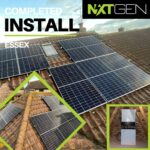 ☀️ Over 10,000 homes in Basildon have a solar panel system installed. ☀️ You’ll normally break even on solar panels in less than 10 years. ☀️ A 3.5kW solar panel system will cost about £7,000 on average. Solar panels are becoming more affordable and more common in the UK, with over 1.3 million households already… Read more: Is it worth buying solar panels in Basildon, Essex?
☀️ Over 10,000 homes in Basildon have a solar panel system installed. ☀️ You’ll normally break even on solar panels in less than 10 years. ☀️ A 3.5kW solar panel system will cost about £7,000 on average. Solar panels are becoming more affordable and more common in the UK, with over 1.3 million households already… Read more: Is it worth buying solar panels in Basildon, Essex? - Unveiling the Perfect Fit: How Many Solar Panels Can Your Roof Handle?
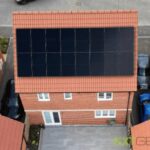 Harnessing the power of the sun is an attractive proposition for many UK homeowners. But before diving headfirst into solar energy, a crucial question arises: how many solar panels can fit on your roof? The answer, unfortunately, isn’t a simple one. It’s a captivating interplay between several factors, each one requiring careful consideration. Understanding Your… Read more: Unveiling the Perfect Fit: How Many Solar Panels Can Your Roof Handle?
Harnessing the power of the sun is an attractive proposition for many UK homeowners. But before diving headfirst into solar energy, a crucial question arises: how many solar panels can fit on your roof? The answer, unfortunately, isn’t a simple one. It’s a captivating interplay between several factors, each one requiring careful consideration. Understanding Your… Read more: Unveiling the Perfect Fit: How Many Solar Panels Can Your Roof Handle? - Powering Care with Sunshine: How Solar Panels Benefit Nursing Homes
 Nursing homes are the backbone of our communities, providing essential care for our elderly population. But keeping these facilities running smoothly requires a significant amount of energy – lighting, heating, cooling and medical equipment all contribute to a hefty energy bill. This is where commercial solar panels come in, offering a win-win solution for both… Read more: Powering Care with Sunshine: How Solar Panels Benefit Nursing Homes
Nursing homes are the backbone of our communities, providing essential care for our elderly population. But keeping these facilities running smoothly requires a significant amount of energy – lighting, heating, cooling and medical equipment all contribute to a hefty energy bill. This is where commercial solar panels come in, offering a win-win solution for both… Read more: Powering Care with Sunshine: How Solar Panels Benefit Nursing Homes - Who are NXTGEN Energy Ltd?
 NXTGEN Energy Ltd are a solar energy company based in Rayleigh, Essex, UK. They specialize in the installation of solar panels, battery storage systems, and electric vehicle chargers for homes and businesses across the UK. They are MCS certified, which means they meet the Microgeneration Certification Scheme’s standards for quality and safety. This makes them… Read more: Who are NXTGEN Energy Ltd?
NXTGEN Energy Ltd are a solar energy company based in Rayleigh, Essex, UK. They specialize in the installation of solar panels, battery storage systems, and electric vehicle chargers for homes and businesses across the UK. They are MCS certified, which means they meet the Microgeneration Certification Scheme’s standards for quality and safety. This makes them… Read more: Who are NXTGEN Energy Ltd? - Why UK Homeowners with Solar Panels Need Bird Proofing (Beyond the Basics)
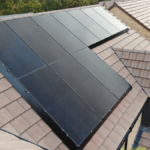 Imagine waking up to the quiet hum of your solar panels, generating clean energy to power your home. It’s a beautiful image, symbolizing lower electricity bills and sustainability. But what if a gang of birds decided the solar panels on your roof were the perfect spot for their new condo complex? Unfortunately, this idyllic scene… Read more: Why UK Homeowners with Solar Panels Need Bird Proofing (Beyond the Basics)
Imagine waking up to the quiet hum of your solar panels, generating clean energy to power your home. It’s a beautiful image, symbolizing lower electricity bills and sustainability. But what if a gang of birds decided the solar panels on your roof were the perfect spot for their new condo complex? Unfortunately, this idyllic scene… Read more: Why UK Homeowners with Solar Panels Need Bird Proofing (Beyond the Basics) - How AI could supercharge your solar panels
 Imagine stepping outside on a crisp January morning, a mug of steaming tea warming your hands. You glance at your rooftop, not with dread at energy bills, but with a mischievous grin. Why? Because the sun, that cheeky orb in the sky, is being squeezed for every juicy watt it holds thanks to your AI-powered… Read more: How AI could supercharge your solar panels
Imagine stepping outside on a crisp January morning, a mug of steaming tea warming your hands. You glance at your rooftop, not with dread at energy bills, but with a mischievous grin. Why? Because the sun, that cheeky orb in the sky, is being squeezed for every juicy watt it holds thanks to your AI-powered… Read more: How AI could supercharge your solar panels - Unprecedented growth in the renewable sector driven by solar power
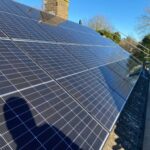 The year 2023 marked a significant milestone in the realm of renewable energy, as solar power emerged as the driving force behind a remarkable 50% surge in global capacity. This remarkable achievement was revealed in the International Energy Agency’s (IEA) Renewables 2023 report, solidifying it as the 22nd consecutive year of record growth in renewable… Read more: Unprecedented growth in the renewable sector driven by solar power
The year 2023 marked a significant milestone in the realm of renewable energy, as solar power emerged as the driving force behind a remarkable 50% surge in global capacity. This remarkable achievement was revealed in the International Energy Agency’s (IEA) Renewables 2023 report, solidifying it as the 22nd consecutive year of record growth in renewable… Read more: Unprecedented growth in the renewable sector driven by solar power - The Allure of Solar and the Pitfalls of Price
 The allure of renewable energy is undeniable. Lowering your carbon footprint while achieving energy independence – it’s a win-win proposition. However, navigating the solar investment landscape can be fraught with hidden costs, particularly when lured by the siren song of bargain-basement prices. Consider the contrasting paths of Dean and Richard, both homeowners embarking on the… Read more: The Allure of Solar and the Pitfalls of Price
The allure of renewable energy is undeniable. Lowering your carbon footprint while achieving energy independence – it’s a win-win proposition. However, navigating the solar investment landscape can be fraught with hidden costs, particularly when lured by the siren song of bargain-basement prices. Consider the contrasting paths of Dean and Richard, both homeowners embarking on the… Read more: The Allure of Solar and the Pitfalls of Price - Why Manufacturing & Logistics Businesses need to invest in Warehouse Solar Panels
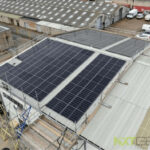 Electricity and energy consumption are major expenses for manufacturing and logistics businesses, as they need them to operate machinery, illuminate and heat their facilities, and transport their goods. Warehouse solar panels can significantly reduce these costs and enhance the company’s financial performance, while also contributing to its sustainability objectives. Installing commercial solar panels on your… Read more: Why Manufacturing & Logistics Businesses need to invest in Warehouse Solar Panels
Electricity and energy consumption are major expenses for manufacturing and logistics businesses, as they need them to operate machinery, illuminate and heat their facilities, and transport their goods. Warehouse solar panels can significantly reduce these costs and enhance the company’s financial performance, while also contributing to its sustainability objectives. Installing commercial solar panels on your… Read more: Why Manufacturing & Logistics Businesses need to invest in Warehouse Solar Panels

